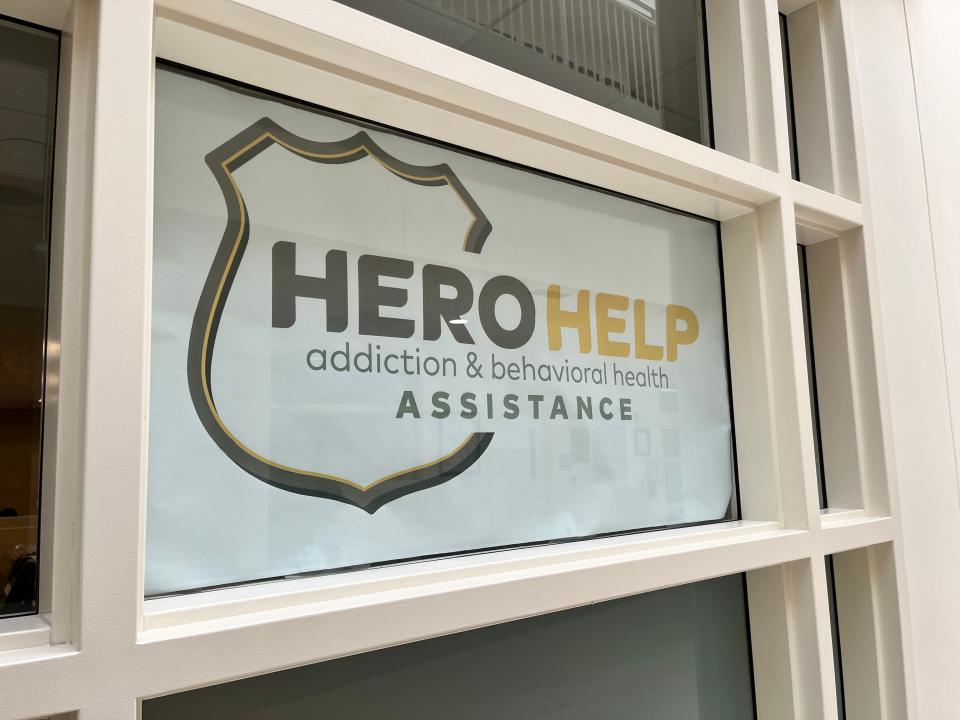Wilmington police unveil new Partners in Care program to address mental health crises
Every day, police officers across the country are called to respond to mental health crises. But many of these officers don't have the training or experience necessary to effectively respond to those experiencing mental illnesses — a lack that can sometimes have dangerous consequences.
Advocates have long called for an increased presence of mental health professionals and social workers in the community alongside police to prevent these negative interactions and connect people in crisis with treatment.
On March 11, the Wilmington Police Department became the latest in the state to take steps to address this need.
The new Partners in Care program, a collaboration between the Wilmington Police Department and ChristianaCare, will pair a mental health clinician with a police officer who has completed the mental health-focused Crisis Intervention Team training program.
"In the case of someone who is experiencing a mental health crisis, a traditional law enforcement response — like an arrest — is far from the best solution," said Wilmington Police Department spokesperson David Karas.
The new co-responder teams will patrol in marked police vehicles from 6 a.m. to 10 p.m. on weekdays, according to the department, and will be supported by a Community Health Liaison from ChristianaCare.
It's a similar model to the New Castle County Police Department's Hero Help program, which was introduced eight years ago with the goal of helping people struggling with addiction to receive treatment rather than jail time. The program expanded a few years later to include a Mental Health Unit.
When asked why the Wilmington Police Department only just introduced its own co-responder program, Karas said the department has already introduced community efforts and programs like resource fairs and the Victim Services Unit to address mental health in recent years — ones that Partners in Care will be expanding on.
Building off existing programs
Like Partners in Care, the New Castle County Police Department's Hero Help program is a joint effort between law enforcement officers and medical professionals with ChristianaCare.
Lt. Allen Herring, who formerly led the department's Behavioral Health Unit and currently oversees the department's Criminal Investigations Unit, said the Wilmington Police Department expressed interest in creating a similar partnership after hearing a presentation on the Hero Help program.
The conversation has been "years in the making," Herring said.

Departments have continued to see increased mental health issues and crises in the community in the wake of the pandemic, even with the introduction of the new, shorter crisis hotline number 988 that sought to limit law enforcement intervention in behavioral health crises when it wasn't necessary.
At the same time, police staffing remains low. And while the implementation of the Hero Help program has lessened some of the burden on the New Castle County Police Department, Herring said getting officers to "buy in" initially was a challenge.
Gaining the support of officers for the new Partners in Care program was one of the areas that the Wilmington Police Department sought advice on, Officer First Class Colleen Kearns said.
Kearns, who works with the Hero Help program and Behavioral Health Unit, said Wilmington police were also interested in the logistics of the program and how to form a partnership with ChristianaCare.
Karas said that choosing to partner with ChristianaCare was a "natural choice," both because of their past collaborations together and the success of the health care provider's partnership with the New Castle County Police Department.
Other agencies, including the Georgetown and New Castle Police Departments, have also expressed interest in starting similar programs.
Many of these officers have the opportunity to learn about other police departments' efforts to improve law enforcement response to mental health crises at statewide Crisis Intervention Team training programs.
Crisis Intervention Team
While the presence of a trained mental health professional is an important part of the new program, there is another half of the partnership: a Wilmington police officer who has completed the Crisis Intervention Team training.
The 40-hour training led by the local chapter of the National Alliance on Mental Illness is based on an international program that teaches law enforcement officers how to effectively assist people experiencing mental health crises.
NAMI Delaware programs manager Wesley Ingram coordinates these trainings in the First State. He helps to teach police officers deescalation techniques, best practices for addressing someone in crisis and how to recognize if someone is experiencing a mental health crisis, even if that's not the original reason that 911 was called.
Many officers, including those with the Wilmington Police Department, are actually part of the committee that plans Crisis Intervention Team trainings, Ingram said.

Ingram said that he and others with NAMI are "very supportive" of programs like Partners in Care, and have already seen the impact that the New Castle County Police Department's partnership with ChristianaCare in reducing arrests and use of force.
"This is definitely a step in the right direction," Ingram said.
Ideally, police would not be involved in any mental health crisis intervention as long as there isn't a risk posed to themselves or others, Ingram said. But limited intervention services —and a lack of public knowledge about resources like 988 — means that law enforcement officers are called regardless of potential danger.
"We need to work on building on that crisis response system," Ingram said.
What comes next?
With the Partners in Care program now in its pilot phase, Karas said the Wilmington Police Department will be focused on gathering and analyzing data about the program and its effectiveness. If the data they collect about the program shows the "anticipated positive outcomes" and the department is able to secure more funding, Karas said they plan to continue to expand it.
"We hope that this initiative will help enhance the overall health and wellness of our community while providing even more connections to resources for those who could benefit," Karas said.
MENTAL HEALTH: Delaware's age 65-plus residents have unique mental health challenges. What's being done
Send story tips or ideas to Hannah Edelman at hedelman@delawareonline.com. For more reporting, follow them on X at @h_edelman.
This article originally appeared on Delaware News Journal: Wilmington police launch co-responder program with ChristianaCare

